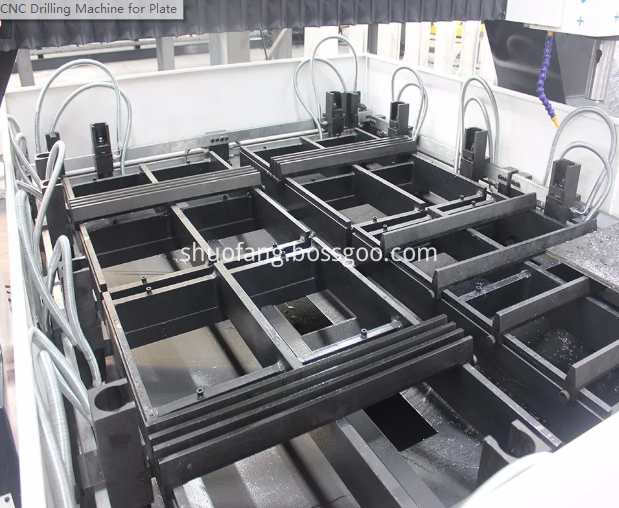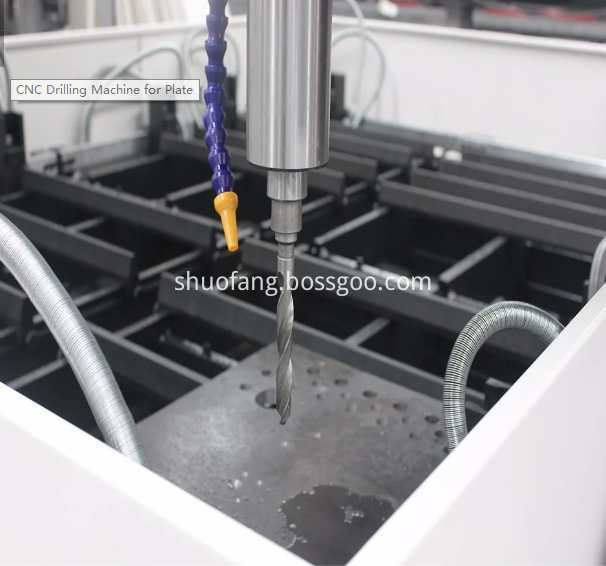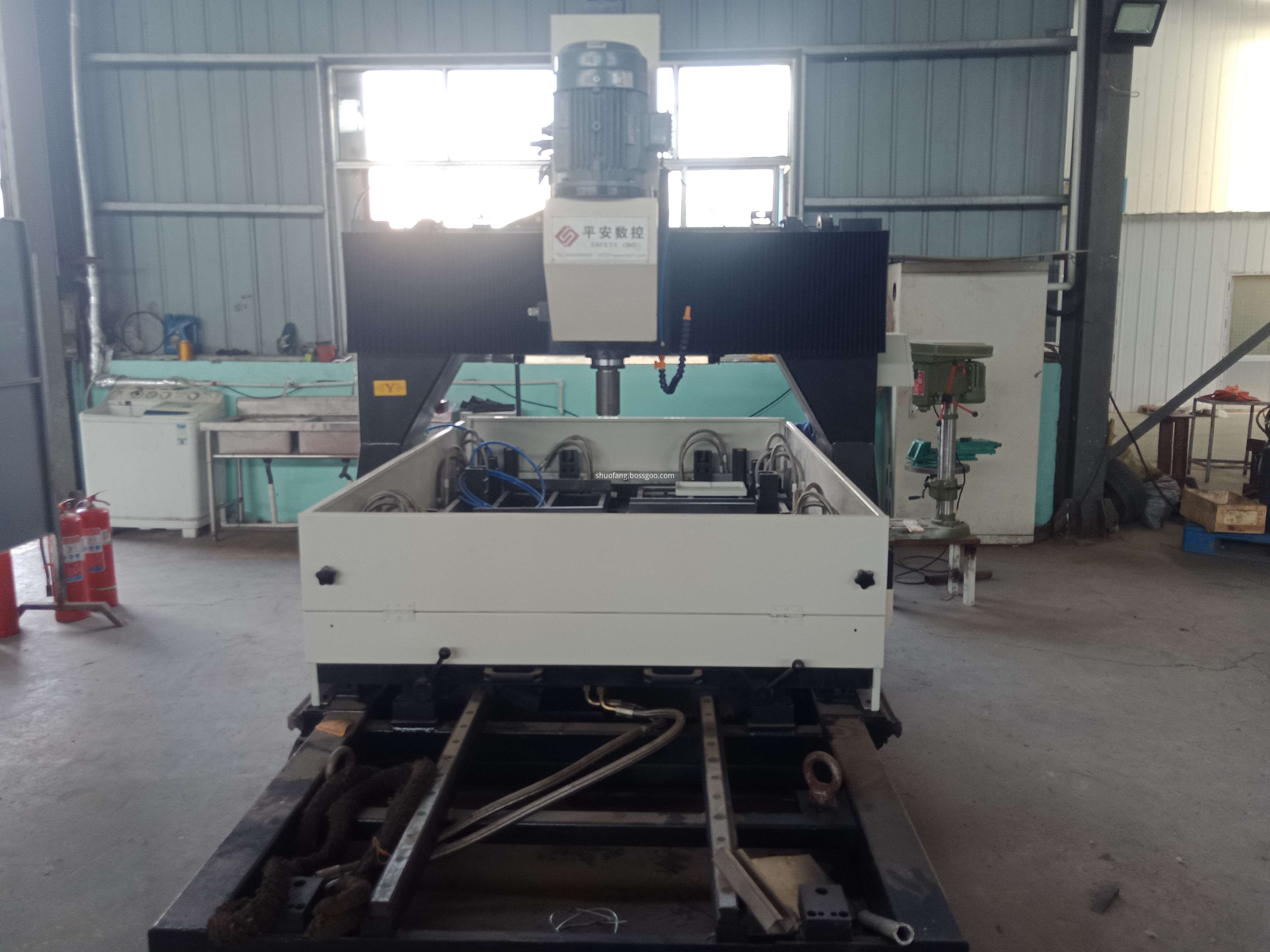In the first half of 2017, the Chinese auto market has both challenges and opportunities. Under the new normal, when the sales growth rate gradually slowed down and the market competition became more and more fierce, adjustment, change and cooperation became the key words of the auto market in the first half of 2017. Mergers and acquisitions have become the norm. <br> As the global automotive market becomes more closely linked, mergers and acquisitions between car companies have gradually become the norm. Joint venture dramas are staged in succession As the world's largest auto market, the importance of the Chinese market is undoubted, and the joint venture in China is also seen by many multinational auto companies as an important measure to promote development in China. In the first half of the year, the joint venture dramas in China were successively staged, and there were both turbulent and fruitful results.
Gantry Drilling Machine is used for drilling steel plate,
The machine bed is made of high quality gray cast iron with stable performance.
All of our steel drill machine adopt hydraulic clamping system to improve production efficiency.
All of our Steel Plate Drilling Machine adopts German SEW deceleration motor, high efficiency and very durable.
SF drill machine for steel is one of your best choice!
Gantry Drilling Machine Gantry Drilling Machine,steel drill machine,drill machine for steel,steel plate drilling machine Shandong ShuoFang Environmental Technology Co., Ltd. , https://www.chinafincnc.com
A number of policies were intensively introduced. On April 14, the Ministry of Commerce issued the "Automobile Sales Management Measures" (hereinafter referred to as the "New Measures"), which was officially implemented on July 1 this year. The "Automobile Brand Sales Management Implementation Measures", which has been in use for 12 years, was abolished at the same time. With the rapid development of the automobile market, the "Measures for the Implementation of Automobile Brand Sales Management" has gradually adapted to the actual needs and has produced various drawbacks. Compared with the "Automobile Brand Sales Management Implementation Measures", one of the biggest differences between the new "Measures" is the removal of the word "brand". This seemingly simple word has completely broken the original "brand licensing" rules of the automotive industry. The new "Measures" allow for the existence of multiple car sales, which means that consumers' car purchase channels are more diverse. In addition, the new "Measures" have also broken down the problem of the geographical restrictions on car purchase, the purchase of cars, the compulsory purchase of insurance, and the mandatory after-sales service that consumers have to face in the process of car purchase, which has greatly safeguarded the purchasing rights of consumption.
Since the first half of this year, a number of policies on new energy vehicles have also been launched intensively. On January 16 this year, the Ministry of Industry and Information Technology of the Ministry of Industry and Information Technology issued the "Regulations on the Administration of New Energy Vehicle Production Enterprises and Product Access" (hereinafter referred to as the "Regulations"), and it will be implemented from July 1 this year. It is worth mentioning that the "Regulations" have also established a "stopping" system. The "Regulations" clarify that if a production enterprise finds serious problems such as the safety of new energy automobile products, it shall immediately stop the production and sales of related products and take measures to carry out rectification; the production enterprises cannot maintain the "access examination requirements", and there is public safety and personal presence. In the case of health, safety of life and property, the Ministry of Industry and Information Technology shall order it to stop production and sales activities and order it to be corrected immediately.
On June 13 this year, the "Parallel Management Measures for the Average Fuel Consumption of Passenger Vehicle Enterprises and New Energy Vehicle Points (Draft for Comment) was released. This approach proposes a mechanism for “parallel†management of enterprise average fuel consumption (CAFC) and new energy vehicle credits (NEV), the so-called double point system. In the future, the car companies will be required to jointly achieve the corresponding points in the two aspects of fuel consumption and new energy vehicles. Enterprises that fail to meet the points and fail to pay the negative points will face the suspension of the declaration of the car catalogue and the suspension of the production of some traditional car models. Or the penalty of import.
On March 6, PSA and General Motors issued a statement to transfer GM's Opel and Vauxhall to PSA for a value of 1.3 billion euros. Also transferred together is General Finance Europe, a transaction valued at €900 million, acquired by a 50:50 joint venture between PSA and BNP Paribas. In recent years, GM's business in Europe has suffered losses for years. As a result, GM decided to sell Opel, and after the acquisition of Opel, PSA became the second largest auto group in Europe after Volkswagen Group.
On June 23, Geely and Proton officially signed a binding agreement in Kuala Lumpur, Malaysia to realize the official acquisition of Malaysian Proton and the luxury sports car brand Lotus. Upon completion of the acquisition, Geely will hold a 49.9% stake in Proton and a 51% stake in Lotus. So far, following the acquisition of Volvo, Geely's car map has added two international car brands. As a representative of local brands in the Southeast Asian market, Proton has two factories with a capacity of 350,000 units, which will become an important base for Geely to enter the market.
Recently, Takata Co., Ltd., which has been trapped in the "airbag door" for several years, officially filed for bankruptcy protection in the United States and Japan. At the same time, domestic wins Electronics announced that KSS, a subsidiary of the company, has signed a memorandum of understanding with Takada, intending to acquire the latter business other than ammonium nitrate gas generator at a price of up to 1.588 billion US dollars.
Since November last year, Audi confirmed that the news of the establishment of a joint venture with SAIC in China, the game between Audi and Chinese dealers has never stopped, and the joint venture plan of SAIC Audi has also been twisted and twisted, and the reversal of the drama has continued. On May 19th, Audi Dealers Association, China First Automobile Group Corporation, FAW-Volkswagen Automotive Co., Ltd. and Audi Company reached a consensus on the development of Audi brand in China, including ensuring sales of 900,000 vehicles in 2022; third parties in China The Audi vehicles produced did not start selling as early as January 2022; and on the channel issue, a consensus was reached on the direction of a sales company and dealer network. However, to this day, the joint venture drama continues. Recently, there is news that the SAIC Audi project is still advancing, but the content has been adjusted and started to take action on new energy vehicles.
In contrast, another joint venture project of the Volkswagen Group in China is clearly much smoother. On June 1, Jianghuai Automobile and Volkswagen Group formally signed a joint venture agreement in Berlin, Germany. The two parties will jointly establish a 50% joint venture to develop, produce and sell new energy vehicles and provide relevant mobile travel. service. The Jianghuai Volkswagen New Energy Vehicle Project is also the first project of a Sino-foreign joint venture new energy vehicle.
Last week, Renault Group announced that it has signed a binding framework cooperation agreement with Brilliance China Automotive Corporation to establish a joint venture in China. In order to establish a joint venture, Renault Group will acquire a 49% stake in Shenyang Huachen Jinbei Automobile Co., Ltd. from Brilliance China Automotive Co., Ltd., and reorganize Shenyang Huachen Jinbei Automobile Co., Ltd. into a joint venture jointly owned by Brilliance China Automotive and Renault Group. Renault Group said that the project will promote the common development of Renault Group and Brilliance China Automotive's light commercial vehicle business in the Chinese market.
Frequent personnel changes <br> When the Chinese auto market enters a new normal, the Chinese auto market is undergoing many changes. In this environment, the seats of car executives change more frequently.
In March, large-scale personnel adjustments of various car companies were successively staged. Toyota Motor Corporation announced that it has made new personnel adjustments around the world since April 1, with as many as five people involved in the Chinese market. After undergoing personnel adjustments in 2013 and 2016, BAIC Group made another major adjustment in early 2017, including the top leaders of several companies including BAIC, Beijing Hyundai, Beijing Benz and Beijing Penglong. Was replaced. Also in March, Nissan Motors after the acquisition of Mitsubishi Motors announced a number of high-level appointments involving 23 executives.
Dongfeng Peugeot and Citroen, which continued to decline, also made high-level adjustments. In March, Wu Shaoge, who had held senior positions at FAW-Volkswagen, Dongfeng Peugeot and BMW Brilliance, returned to Dongfeng Peugeot, and the position rose to the deputy general manager; former Jaguar China Executive Vice President Che Yanhua will join Shenlong Automobile as the vice president of Dongfeng Citroen Brand Department. Manager; Deng Ling, who previously served as senior brand manager of Changan Ford C-Class, served as the head of Dongfeng Citroen's marketing department.
In April, Dongfeng and FAW executives exchanged blood. FAW “Veteran†An Tiecheng was transferred to Dongfeng as the deputy general manager of Dongfeng Motor. The former deputy general manager of Dongfeng Motor Qiu Xiandong was the member of the Standing Committee and deputy general manager of the FAW Group. Since the main board block multiple high-level changes. In June this year, two years after the transfer of Yan Yanfeng to the chairman and party secretary of Dongfeng, the largest management adjustments carried out by Dongfeng involved “top leadersâ€. Liu Weidong, member of the Standing Committee and Deputy General Manager of Dongfeng Company, is no longer responsible for Shenlong Company and Dongfeng Hongtai Company. An Tiecheng succeeded Liu Weidong as the chairman of Shenlong Company. Li Chunrong, former general manager of Dongfeng Passenger Vehicle Company, transferred to Dongfeng Honda Automobile Sales Co., Ltd. as party secretary and reopened the management of the joint venture company.



December 11, 2019